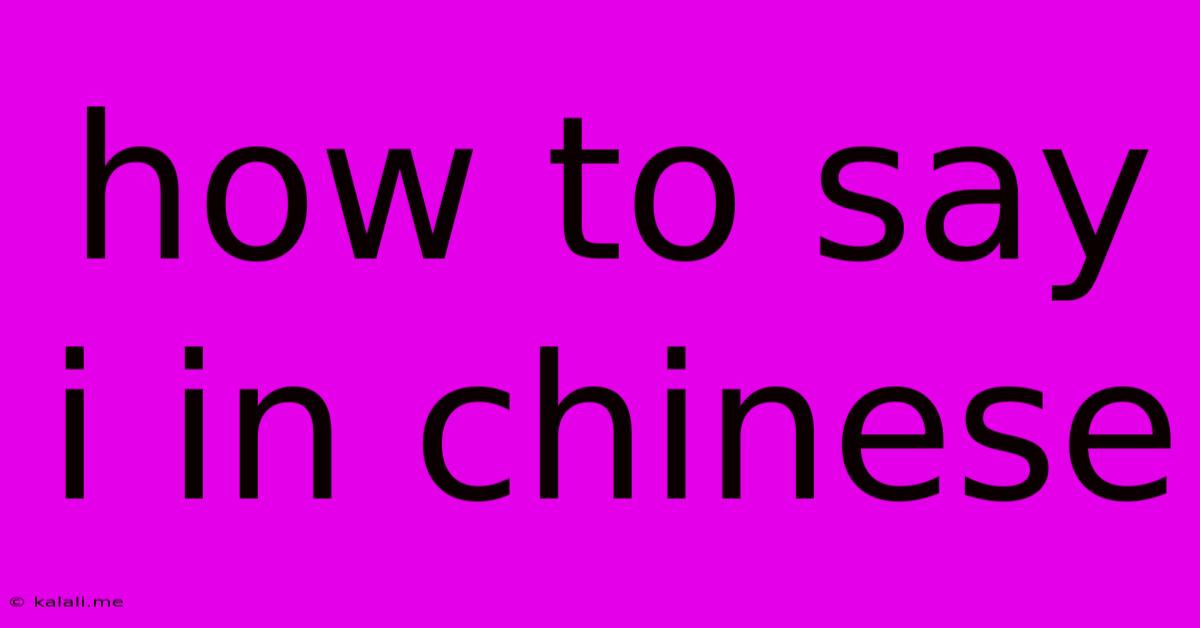How To Say I In Chinese
Kalali
Jun 03, 2025 · 3 min read

Table of Contents
How to Say "I" in Chinese: A Comprehensive Guide
This article will delve into the nuances of expressing "I" in Mandarin Chinese, exploring the various pronouns available and when to use each one. Understanding these subtle differences is key to mastering conversational Mandarin and avoiding common mistakes. This guide provides a practical understanding of the different pronouns, helping you choose the right one for any situation.
The most common way to say "I" in Chinese is 我 (wǒ). However, the use of personal pronouns in Mandarin Chinese is more nuanced than in English. There are other pronouns that can be used depending on context, formality, and even regional variations. This often depends on the relationship between the speakers and the overall context of the conversation.
The Most Common Pronoun: 我 (wǒ)
我 (wǒ) is the most versatile and widely used pronoun for "I" in Mandarin Chinese. It's appropriate in almost all situations, from formal business meetings to casual conversations with friends. It's the default choice unless there's a specific reason to use a different pronoun. You can use it with all verbs and sentence structures without any hesitation. For example:
- 我吃苹果。(Wǒ chī píngguǒ.) I eat apples.
- 我学习中文。(Wǒ xuéxí Zhōngwén.) I study Chinese.
- 我去了北京。(Wǒ qùle Běijīng.) I went to Beijing.
This simple pronoun forms the foundation of expressing yourself in Mandarin. Mastering its pronunciation and usage is paramount.
Less Common, but Important Pronouns
While 我 (wǒ) covers most situations, knowing these alternatives will elevate your Chinese proficiency:
-
本 (běn): This humble pronoun is used mostly in formal settings or when speaking to someone of higher status. It implies a sense of humility and self-deprecation. Think of it as a more formal and respectful version of "I". For example, "本公司 (běn gōngsī)" means "our company" or "this company," a self-referential expression where the speaker is humble, often the speaker's own company.
-
在下 (zài xià): This archaic pronoun is rarely used in modern conversation. It's highly formal and typically found in traditional operas or historical dramas. It translates literally to "below" or "underneath" – conveying a deep sense of humility.
-
朕 (zhèn): This is an extremely formal and archaic pronoun exclusively used by emperors in ancient China. It is not used in modern Mandarin conversation.
-
贫僧 (pínsēng): This is a pronoun used by Buddhist monks to refer to themselves, meaning "this poor monk." It's highly specific and should only be used in this context.
-
奴 (nú): This is a highly archaic and rarely used pronoun. It's historically associated with servitude and is thus inappropriate for modern usage.
Choosing the Right Pronoun: Context is Key
The best way to learn when to use each pronoun is through immersion and practice. However, remember that 我 (wǒ) is your go-to option in the vast majority of situations. The other pronouns are mainly used for specific situations and carry significant cultural connotations.
Beyond Pronouns: Expressing Yourself Naturally
While mastering the pronouns is crucial, remember that Chinese conversation often relies less on explicit pronoun usage than English. The context of the sentence frequently makes the "I" implicit. For instance, instead of saying "I want to eat," you might simply say "想吃 (xiǎng chī)," which directly translates to "want to eat," with the subject "I" understood from context.
This guide provides a comprehensive understanding of how to say "I" in Chinese. While 我 (wǒ) will serve you well in most scenarios, grasping the nuances of other pronouns and the context-dependent nature of personal pronouns enhances your communication abilities significantly. Practice and immersion are key to mastering these subtleties and expressing yourself fluently in Mandarin Chinese.
Latest Posts
Latest Posts
-
Can You Touch The Net In Volleyball
Jun 05, 2025
-
Which Country Is More Dangerous Nicaragua Or Guatemala
Jun 05, 2025
-
Where Was Daniel During The Fiery Furnace
Jun 05, 2025
-
How Do I Fill Nail Holes In Trim
Jun 05, 2025
-
Bytefield How To Escape Parentheses In String
Jun 05, 2025
Related Post
Thank you for visiting our website which covers about How To Say I In Chinese . We hope the information provided has been useful to you. Feel free to contact us if you have any questions or need further assistance. See you next time and don't miss to bookmark.